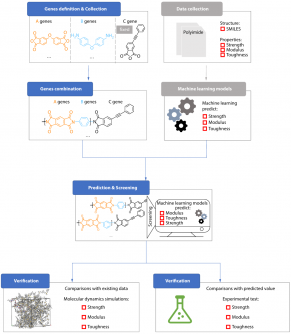Top Stories
AI Breakthrough Transforms Design of Ultra-Tough Polyimide Films

URGENT UPDATE: A groundbreaking AI-driven strategy has just been unveiled, revolutionizing the design of ultra-tough polyimide films, crucial for aerospace and flexible electronics. Researchers from the East China University of Science and Technology announced this development on September 2, 2025, in the Chinese Journal of Polymer Science, marking a significant leap in materials science.
This innovative approach leverages machine learning to rapidly optimize polyimide films, addressing longstanding challenges in mechanical performance. Traditionally, improving one property often compromises another, leading to slow and costly trial-and-error methods. The new strategy, termed the materials-genome approach (MGA), allows for the simultaneous prediction of multiple mechanical properties, drastically reducing development time and costs.
The research team developed a machine-learning model that predicts three critical mechanical parameters—Young’s modulus, tensile strength, and elongation at break—across a staggering 1,720 candidate structures. By treating polymer structural fragments as “genes,” the model achieved impressive predictive accuracy, with R² values around 0.70–0.74 for all metrics. This breakthrough led to the discovery of a novel formulation, PPI-TB, which outperformed established benchmark polyimides.
Notably, PPI-TB demonstrated a modulus of 3.48 GPa, showcasing superior toughness and strength compared to leading materials like PETI-1 and O-O-3. Molecular dynamics simulations confirmed these findings, validating the efficacy of the AI-driven design process.
Prof. Li-Quan Wang, a leading researcher on the project, stated,
“Machine learning not only predicts performance but also reveals which chemical ‘genes’ are driving it. This synergy between data science and chemistry allows us to explore material possibilities that would take decades by conventional means.”
The implications of this research extend far beyond polyimides. The MGA framework can be adapted for various high-performance polymers, paving the way for lightweight, durable materials essential in cutting-edge technologies. As industries strive for enhanced thermal stability and insulation, this rapid design methodology is poised to accelerate innovation in microelectronics and aerospace composites.
Looking ahead, this AI-driven approach could redefine the future of polymer development, significantly reducing the time from concept to application. The research was supported by the National Key R&D Program of China and the National Natural Science Foundation of China, emphasizing its importance to both academic and industrial advancements.
Stay tuned for more updates as this revolutionary method could change the landscape of materials science and engineering, impacting how we create the next generation of high-temperature polymers.
-

 Science2 weeks ago
Science2 weeks agoResearchers Challenge 200-Year-Old Physics Principle with Atomic Engines
-

 Politics1 week ago
Politics1 week agoNHP Foundation Secures Land for 158 Affordable Apartments in Denver
-

 World3 days ago
World3 days agoBoeing’s Aircraft Production: Assessing Numbers and Challenges
-

 Health2 weeks ago
Health2 weeks agoNeuroscientist Advocates for Flag Football Until Age 14
-

 Lifestyle1 week ago
Lifestyle1 week agoLongtime Friends Face Heartbreak After Loss and Isolation
-

 Top Stories3 days ago
Top Stories3 days agoUrgent Search for Suspect Who Exposed Himself to Teen Girl
-

 World2 weeks ago
World2 weeks agoGlobal Military Spending: Air Forces Ranked by Budget and Capability
-

 Politics2 weeks ago
Politics2 weeks agoIsraeli Air Strikes in Lebanon Kill One, Wound Seven Amid Tensions
-

 Health1 week ago
Health1 week agoFDA Launches Fast-Track Review for Nine Innovative Therapies
-

 Business2 weeks ago
Business2 weeks agoMaine Housing Inventory Surges to Post-Pandemic High
-

 Business2 weeks ago
Business2 weeks agoSpirit Airlines Cuts Workforce with Furloughs for 365 Pilots
-

 Politics1 week ago
Politics1 week agoMassachusetts Lawmakers Resist Audit After Voter Mandate









